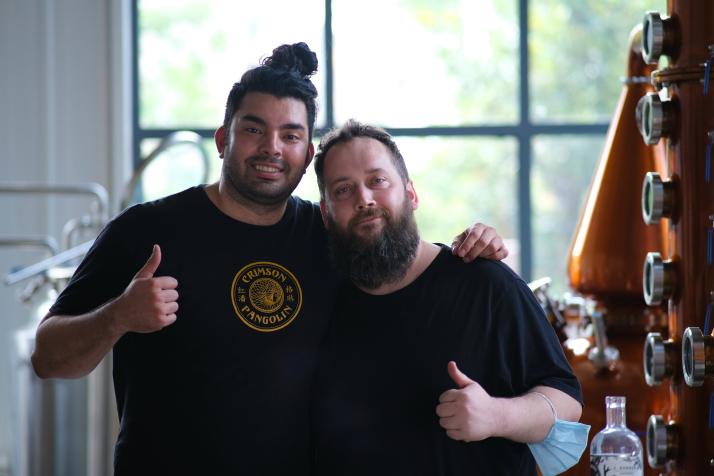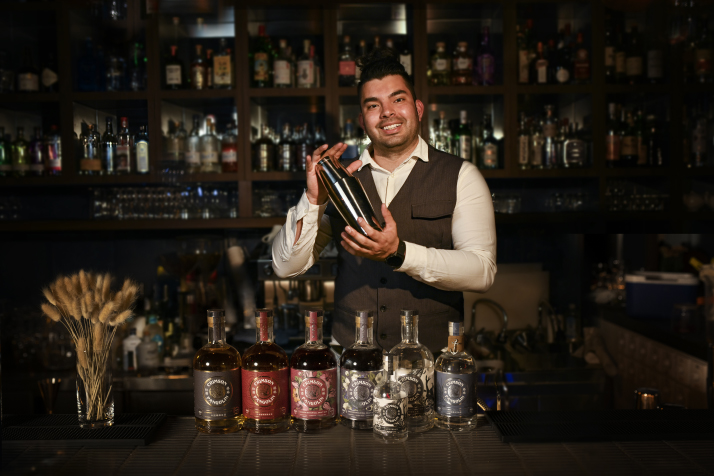| Lifestyle |
| Pouring infusion | |
|
|
 David Muñoz (left) in the Crimson Pangolin distillery with master distiller Mark Lloyd in Changsha, Hunan Province (COURTESY PHOTO)
With a handful of beverage brands registered in China, Colombian David Muñoz's business is on the rise as he conquers new areas of the Chinese consumer market. Muñoz has been living in Shanghai for almost 15 years, first as a representative of the family business and then in charge of his own company. With a characteristic Medellin accent adding to his already abundant charisma, Muñoz is like a people magnet. His family once owned an import company acquiring food and beverages from China, Malaysia and Viet Nam. He arrived in Shanghai in 2008, just as the Beijing Summer Olympics got underway, marking China's "before and after" in the eyes of the world. During the first four years, Muñoz was in charge of supervising company cargo traveling to Colombia, but with the rise of the U.S. dollar in 2012, this business ceased to be lucrative. "I had one year to refocus my energies and reinvent myself in Asia," Muñoz said of that time. After taking a break, he decided to channel his energy into shaping his own company in 2013 and 2014, at which time Vitaespirits was born, introducing liquors, drinks and food from Latin America to the Chinese market. Muñoz added how the early onset was a period of great sacrifice, but also one of learning. And even with this company up and running, the Colombian wanted to go one step further, which is why he established a second business in the summer of 2017, namely, Crimson Spirits. "The imports were very successful and we developed a large commercial channel featuring distributors, bars, restaurants and hotels; but we were always working with our suppliers' brands," he recalled. A new blend For a long time, Muñoz had wanted to create his own brand, but he didn't know how. Until one day, Helena Kidacka, his partner and now wife, suggested: Why not try gin? The alcoholic beverage is obtained by distillation from a base of grain (wheat or barley). In a further procedure, botanicals along with water are added until the desired flavors are met. To be called a gin, the spirit must have a predominant flavor of juniper berries. Modern-day London dry gin can trace its beginnings back to the 12th century and over time became one of England's flagship spirits. Muñoz and his partner took all these traditional elements as a base, but at the same time tried to provide distinctive characteristics from the Chinese palate. Their dedication resulted in Crimson Pangolin Gin, the star product of Crimson Spirits which has six editions to date. Its raw materials hail exclusively from China, such as juniper berries from Shandong Province, lemons from Hainan Province, and coriander seeds, spices, and chili peppers from Hunan and Sichuan provinces. Being made in China is one factor that has helped the brand better position itself against the competition. "As a local product, we have the advantage of faster production—at a more competitive cost," Muñoz explained. Imported products, in contrast, are more expensive due to the chain of logistics, the payment of tariffs and, lately, several trade barriers stemming from a challenging geopolitical landscape. Since 2017, the company has seen exponential expansion courtesy of a series of new products in its beverage portfolio. All of them respond to a certain niche and have been designed with a clear objective; from Sipstainable, an ecological alternative that comes in 100-percent recyclable five-liter packaging, to Gincha Hard Tea Seltzer, a ready-to-drink cocktail designed for women between 20 and 30. Meanwhile, Nine Wild Tales, another one of Crimson Spirits' distinctive liquors, is the first of its kind as it is based on one of the most popular ingredients in Chinese cooking: the Sichuan chili pepper. "We traveled to the most remote towns in China in search of the best chili peppers to make a spectacular product," Muñoz stated in an interview with China Hoy, a Spanish monthly published by CICG Americas. The entrepreneur has managed to combine keen business acumen with many years of experience in the field. In that sense, he has also become an accomplished mixologist, making his brands known through a range of inventive cocktails served up in bars and restaurants across different cities. "I'm very social and I love being around people," he said. "We really care about our customers' opinions and intend to learn from the consumer experience."  Colombian entrepreneur David Muñoz (COURTESY PHOTO)
Shaking things up One of the most valuable lessons China has taught Muñoz over the years is about the power of adaptation, starting from the fact that the country is an ancient civilization. "The Chinese do not adapt to you and your products, you adapt to them," he said. Muñoz has had to master new strategies to carve out his space in the market. Unlike Latin America and other parts of the world, where supermarkets and stores are often the first point of purchase for groceries and beverages, the situation in China is very different. Thanks to the country's tech wave over the past decade, the Chinese have also changed their consumption habits, moving toward a more convenient and faster format through online shopping. "Most consumption here occurs through e-commerce," he added. "Tmall, JD.com and Taobao account for 90 percent of business-to-customer alcohol sales." Muñoz elaborated that although the spirits sector is growing by leaps and bounds, this industry is still in its infancy, so huge potential lies ahead. As traditional Chinese spirits and baijiu (Chinese liquor usually distilled from fermented sorghum) target a more traditional, older demographic while the younger generations no longer consume them, Muñoz spotted an in. This progression, coupled with the greater purchasing power of a continually expanding middle-income group in China, lends Crimson Spirits products a wide market. "We try to create more 'educational' campaigns, and the Chinese love that; they love to learn how to make a cocktail or how a certain drink is produced." This year has been one of the toughest years for China's food and beverage industry due to COVID-19 flare-ups. But Muñoz remains upbeat and hopeful about the future. He believes related restrictions will soon be lifted, allowing the Crimson Spirits storyline to further unfold. "We want to be the most popular gin in all of Asia as we strongly believe the region will be the future of the global economy," he concluded with visible conviction. Cheers to that. This is an edited version of an article first published in China Hoy Copyedited by Elsbeth van Paridon Comments to yanwei@cicgamericas.com |
|
||||||||||||||||||||||||||||||
|
